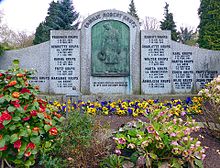Robert Krups (entrepreneur)
Robert Krups senior (born May 15, 1848 in Wald , today a district of Solingen ; † August 18, 1916 there ) was a German entrepreneur and founder of the household appliance brand Krups .
biography
Krups' ancestors on his mother's side were poor farmers in the Eifel region, while his father's ancestors worked in agriculture in the Bergisches Land . With his wife Charlotte geb. Müller (born February 21, 1852, † September 11, 1894) had five sons and four daughters. He was buried in the family grave in Wald at the Evangelical Cemetery on Wiedenkamper Strasse.
Companies
Josua Corts, a small blacksmith from Remscheid , started a modest production of rotary and pocket spring balances in Wald near Solingen in 1846. The nucleus of the factory lay in the Hahnenhaus estate (No. 2). In 1866 his nephew Robert Krups took over the factory and introduced new machines.
In 1900/01 the company moved to the new factory premises to the east of the Hofschaft on today's Heresbachstrasse, then Grenzstrasse. With around 100 employees, mainly kitchen and pocket spring scales were produced. In 1906 four sons of Robert Krups - Friedrich (1875–1927), Karl (1877–1963), Walter (1880–1963) and Eugen (1891–1966) - took over the management and expanded the business. The fifth son Robert jun. (1887–1950) started an administrative career and eventually became mayor of Neuwied . The company was converted into a limited partnership . Krups scales were sold as far as the Netherlands and Switzerland. In addition to the technical precision, efforts were made even then to incorporate modern artist designs into the production.
When the company was taken over by Krups' four sons, the three villas still preserved today were built on Heresbachstrasse south of the factory premises based on designs by the Ohligs family of architects Otto, Max and Karl Franz. In 1905, the English country house style villa at Heresbachstrasse 17 was used as a residence for Friedrich Krups built, the strictly neoclassical villa Heresbachstrasse 7 followed in 1910/11 , to which Robert Krups sen. and his son Robert moved in. Later the property served as a domicile for Karl and Eugen Krups. In 1912/1913 Walter Krups built his villa on the opposite side of the street in the " Neuberg style ".
Individual evidence
- ↑ Julius Keil (ed.): The West German economy and its leading men . North Rhine-Westphalia; Part III, Bergisches Land. Business reading book publisher Dr. Julius Keil, Oberursel 1975, p. 210-215 .
- ^ City of Solingen, Lower Monument Authority, Lohrengel: Description of historical monuments and assessment of the object: Heresbachstr. 7 (January 8, 2014 - page 3/8)
| personal data | |
|---|---|
| SURNAME | Krups, Robert |
| ALTERNATIVE NAMES | Krups, Robert senior |
| BRIEF DESCRIPTION | German entrepreneur |
| DATE OF BIRTH | May 15, 1848 |
| PLACE OF BIRTH | Forest |
| DATE OF DEATH | August 18, 1916 |
| Place of death | Forest |
